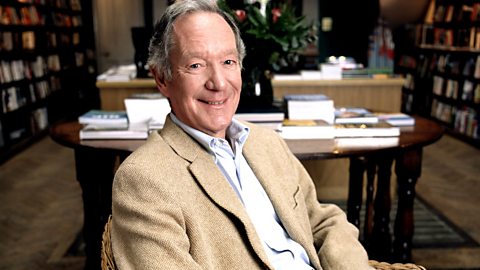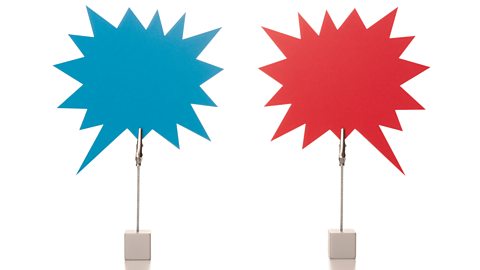The Moral Maze archive is being used by researchers who want to teach computers how to argue. Scientists at Dundee University have been analysing the art of verbal wrestling all the way from ancient Greece to last year’s US Presidential debates, but their most demanding input comes from Radio 4’s long-running debate series.
So what are the keys to winning an argument? Here are some top tips from Professor Chris Reed, of Dundee’s Centre for Argument Technology.

Michael Buerk chairs combative, provocative and engaging debate in the Moral Maze.
1. Be cogent
When arguing it's important to be convincing and clear. One of the best ways of doing this is by finding evidence to support your claims. Sometimes one piece of evidence is enough, but often it’s better to find more than that. The more claims you can make, supported by evidence, the more cogent your argument will be.2. Build your argument
Go further. Much further. Look at the reasons you believe you’re right and find reasons why those reasons are true. Then dig up reasons for those reasons! Analysis conducted on debates tries to build a huge picture mapping the connections between reasons and conclusions all through a debate.3. Be relevant
Some themes turn out to be at the core of a debate, but others are on the fringes. Try to focus on the heart of the issue and avoid getting side-tracked. Getting side-tracked will weaken your stance. Our analysts rate arguments not just for their logic but also for their ‘centrality’.Work out your best debating strategy with BBC Taster
Take the test with BBC Taster: Test Your Argument
Professor Chris Reed, of Dundee’s ‘Centre for Argument Technology’ says: “Machines that can argue would be able to inform public debate on everything from tackling crime to improving public health. They would help us to avoid unconscious biases, weak evidence and poorly thought-through arguments.” But Arg-tech, as it’s called for short, is also producing advice that all of us can use, whether we’re debating issues in a high-powered meeting or arguing with mates down the pub.
Now the team want to get the listeners involved, with a BBC Taster website called Test Your Argument. The idea is to help you work out your best debating strategy and then rate your skill. To kick off the experiment, the team are doing a detailed analysis of the special edition of Moral Maze on the 50th anniversary of the Abortion Act.
Now the team want to get the listeners involved, with a BBC Taster website called Test Your Argument. The idea is to help you work out your best debating strategy and then rate your skill. To kick off the experiment, the team are doing a detailed analysis of the special edition of Moral Maze on the 50th anniversary of the Abortion Act.
4. Counter objections
The best debaters know what their opponents’ arguments are going to be before they even hear them. If you have thought about the attacks that could be launched against your position, you can mention them and deal with them in advance. It might even deter your opponent from using them at all.5. Look for the weak spots
Different types of arguments can be attacked in different ways – although you don’t need to be hostile, so we prefer the word ‘critique’. For example, if you’re met with “This is what the expert says,” you might want to ask whether the expert is biased or has a vested interest.6. Listen
Winning an argument is at least as much about listening as it is about talking. Don't dominate the conversation; let everyone else have their say. The deadliest points tend to be short and sharp.7. Don’t get bogged down
Too often a debater will get stuck on a single aspect of the problem. You need to widen your area of attack, take on more than one opponent and more than one issue.8. Break out of the echo chamber
Most of us like to share our opinions, but too often we talk only to others who agree with us. Because our friends on social media share our point of view, it’s too easy to assume it’s obviously correct. You’ve got to break out of that bubble and force yourself to understand why your opponent thinks differently. A good way to do this is to practice arguing for the opposite of what you believe.
Now you can get involved, by working out your best debating strategy and rating your skill, with a website called Test Your Argument.
Listen to the special edition of the Moral Maze marking 50 years of the Abortion Act.
Work out your best debating strategy with BBC Taster
Take the test with BBC Taster: Test Your Argument
Professor Chris Reed, of Dundee’s ‘Centre for Argument Technology’ says: “Machines that can argue would be able to inform public debate on everything from tackling crime to improving public health. They would help us to avoid unconscious biases, weak evidence and poorly thought-through arguments.” But Arg-tech, as it’s called for short, is also producing advice that all of us can use, whether we’re debating issues in a high-powered meeting or arguing with mates down the pub.
Now the team want to get the listeners involved, with a BBC Taster website called Test Your Argument. The idea is to help you work out your best debating strategy and then rate your skill. To kick off the experiment, the team are doing a detailed analysis of the special edition of Moral Maze on the 50th anniversary of the Abortion Act.
Now the team want to get the listeners involved, with a BBC Taster website called Test Your Argument. The idea is to help you work out your best debating strategy and then rate your skill. To kick off the experiment, the team are doing a detailed analysis of the special edition of Moral Maze on the 50th anniversary of the Abortion Act.
No comments:
Post a Comment